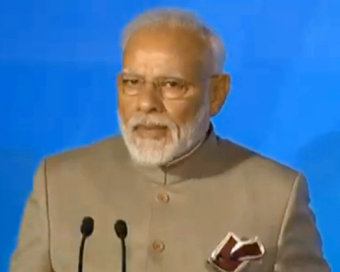 PM Modi visit USA
PM Modi visit USA Only the mirror in my washroom and phone gallery see the crazy me : Sara Khan
Only the mirror in my washroom and phone gallery see the crazy me : Sara Khan Karnataka rain fury: Photos of flooded streets, uprooted trees
Karnataka rain fury: Photos of flooded streets, uprooted trees Cannes 2022: Deepika Padukone stuns at the French Riviera in Sabyasachi outfit
Cannes 2022: Deepika Padukone stuns at the French Riviera in Sabyasachi outfit Ranbir Kapoor And Alia Bhatt's Wedding Pics - Sealed With A Kiss
Ranbir Kapoor And Alia Bhatt's Wedding Pics - Sealed With A Kiss Oscars 2022: Every Academy Award Winner
Oscars 2022: Every Academy Award Winner Shane Warne (1969-2022): Australian cricket legend's life in pictures
Shane Warne (1969-2022): Australian cricket legend's life in pictures Photos: What Russia's invasion of Ukraine looks like on the ground
Photos: What Russia's invasion of Ukraine looks like on the ground Lata Mangeshkar (1929-2022): A pictorial tribute to the 'Nightingale of India'
Lata Mangeshkar (1929-2022): A pictorial tribute to the 'Nightingale of India' PM Modi unveils 216-feet tall Statue of Equality in Hyderabad (PHOTOS)
PM Modi unveils 216-feet tall Statue of Equality in Hyderabad (PHOTOS)The Badminton Association of India (BAI) has announced a 14-member-strong India squad for
- Men’s Sr Hockey Nationals to be played in division-based format from April 4
- Mensik denies Djokovic 100th title in Miami final
- KIPG: Son of a vegetable vendor, Bihar’s Jhandu Kumar eyes Worlds, 2028 Paralympics
- Hardik Singh credits hard work and team unity for receiving HI Midfielder of the Year award
- Djokovic, Alcaraz land in same half of Miami draw
Modi wants quick disposal of cases; to initiate structural changes Last Updated : 11 Oct 2019 06:15:26 AM IST 
PM Narendra modi (File photo) With over 3.30 crore cases piled up in the Indian courts for disposal, the Narendra Modi-led government has finally instructed the Union Ministry of Law and Justice to "find out a way for reducing delays and arrears" in the country's justice system.
The government has also asked the Law Ministry to initiate structural changes in the existing set up to reduce an unprecedented pendency of cases, especially in the subordinate courts at the district level where over 2.84 crore cases remain unresolved for years.
Subsequently, on September 25, the Ministry of Law and Justice held a brain storming session on the issue and asked the key legal experts of the government to suggest ideas to tackle one of the crucial problems of pending cases facing the people of the country.
The letter by G.R. Raghvender, Joint Secretary in the Department of Justice, addressed to all the important functionaries of the Ministry said that "re-engineering of court procedure for quick disposal of cases" is one such idea which can reduce the burden on the judiciary.
Another idea is to provide better infrastructure to district and lower courts and increasing the strength of the subordinate judiciary.
The Modi government also contemplates to set performance standards, which can be an effective measure to enhance accountability in the judicial system. The letter also revealed that the Law Ministry will hold its own brain storming session in the national capital on Friday.
In June 2019, Chief Justice of India (CJI) Ranjan Gogoi had written to Prime Minister Modi on the issue of acute pendency of cases in the Supreme Court and high courts. The CJI had suggested to increase the strength of judges and raise the retirement age of high court judges to 65 years.
In his letter to the Prime Minister, Justice Gogoi had also revealed that one of the prime reasons "why the higher judiciary is not being able to contain the ever-growing pendency is shortage of high court judges wherein 37 per cent of the sanctioned strength was lying vacant."
Sources said that concerned with the problem of pendency of cases, Modi had asked Union Law Minister Ravi Shankar Prasad to take appropriate steps to address the issue.
Data reveals that in the high courts, over 43 lakh cases are reportedly pending while in the Supreme Court, the figure touched almost 60,000.
By and large, the burden of pendency of cases has mainly affected the poor. In civil disputes, the situation is worse with a large number of cases pending for over 30 years.
Another area of concern is over population of jails where several thousands of undertrials are awaiting trial for years.
As far as the situation in the states are concerned, Uttar Pradesh is worst hit with pendency of over 61 lakh cases, followed by Maharashtra (33.22 lakh), West Bengal (17.59 lakh), Bihar (16.58 lakh) and Gujarat (16.45).
Gujarat and Maharashtra also have the highest number of civil cases pending in the subordinate courts.IANS New Delhi For Latest Updates Please-
Join us on
Follow us on








172.31.16.186







